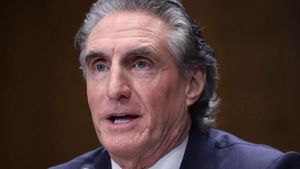A federal district judge has temporarily blocked the Trump administration's plan to suspend spending on grants and loans, marking another significant setback for President Trump amid legal challenges. Chief Judge John J. McConnell Jr. of the U.S. District Court for the District of Rhode Island issued the restraining order on February 1, 2025, after reviewing the controversial actions proposed under the administration’s directive.
The ruling is the result of lawsuits filed by Democratic attorneys general from 22 states, alongside the District of Columbia, highlighting concerns about the constitutionality of the Trump administration's spending freeze. According to the judge's 13-page ruling, the administration's actions “violate the Constitution and statutes of the United States.”
McConnell pointed out the failures of the Executive to follow established legal procedures under the Impoundment Control Act of 1974, which dictates how the President may request Congress to rescind appropriated funds. “Federal law specifies how the Executive should act if it believes appropriations are inconsistent with the President’s priorities—it must ask Congress, not act unilaterally,” he wrote.
The legal dispute was sparked by the administration's issuance of a memo from the Office of Management and Budget (OMB) earlier this week, which called for halting all federal grants and loans. This directive caused immediate confusion about its scope and impact, as it appeared to affect numerous programs, including significant funding for education and public health without exemption for key areas like Social Security.
Following the backlash, the OMB memo was rescinded, but not before the confusion was exacerbated by statements from White House Press Secretary Karoline Leavitt, who insisted on social media, “The President's executive orders on federal funding remain in full force and effect and will be rigorously implemented.” This contradiction was pivotal for Judge McConnell, who stated, “the issues presented here are not moot” due to the administration's continuous stance on the funding freeze.
During the virtual hearing before the court, U.S. Justice Department attorneys argued the case was no longer necessary as the OMB memo had been withdrawn, but Judge McConnell dismissed this reasoning as “a distinction without a difference.” The judge's temporary restraining order remains effective until the court evaluates the Democratic state attorneys general’s request for a preliminary injunction.
New York Attorney General Letitia James, leading the coalition against the freeze, highlighted the detrimental effects of the Trump administration's move, stating, “The President cannot unilaterally halt congressional spending commitments. I will continue to fight against these illegal cuts and protect the services millions across the country depend on.”
The judge’s order explicitly prohibits the Trump administration from freezing any forms of federal financial assistance, thereby ensuring funds will remain available to the states. According to McConnell, “The Executive’s refusal to disburse them is contrary to congressional intent and directive and is arbitrary and capricious.” Addressing the urgency and impact of the administration's attempt, he added, “The proposed policies threaten the States’ ability to conduct necessary activities and gave them little notice, preventing proper planning and function without the promised funds.”
Democratic leaders from affected states characterized the administration's actions as reckless and dubbed the funding freeze as harmful to vulnerable populations. Wisconsin Governor Tony Evers expressed unequivocal concern, stating, “The Trump Administration's attempts to withhold federal funding from Wisconsin hurts kids, families, seniors, and communities across our state.”
Other states involved in the lawsuit include California, New Jersey, Illinois, New York, and Maryland, all of which expressed similar sentiments of urgency to safeguard federal funding necessary for maintaining state services.
This legal maneuver is part of broader scrutiny and challenges facing the Trump administration, particularly involving the executive power's limits concerning funding and financial obligations. Federal appropriations laws have been historically upheld as providing Congress with control over federal finances, stressing the importance of adherence to these fundamentals.
Meanwhile, the ruling affirms the judiciary's role as a check on executive authority, ensuring compliance with constitutional provisions and preserving the separation of powers. With this temporary restraining order, it signals to the Trump administration and its officials the constraints placed on unilateral executive decisions related to federal funding.
Judge McConnell's ruling is not only a win for Democratic leaders pushing back against the executive order but also reinforces the foundational legal structures governing federal financial operations, representing the significance of state-level authority and activism against administrative policies perceived as detrimental.
This legal backdrop will play out over the coming months as lawyers for the administration and state prosecutors continue to engage before the courts, underscoring how executive actions, particularly those aimed at halting federal support, can be challenged effectively by states exercising their legal rights.
Given the significant ramifications involving state funding, public services, and the authority of the President, this ruling indicates the potential for continued legal battles over federal appropriations well beyond the current administration.



